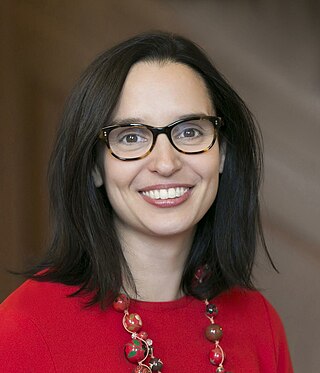Related Research Articles

James Gardner March was an American political scientist, sociologist, and economist. A professor at Stanford University in the Stanford Graduate School of Business and Stanford Graduate School of Education, he is best known for his research on organizations, his seminal work on A Behavioral Theory of the Firm, and the organizational decision making model known as the Garbage Can Model.
Legitimation, legitimization (US), or legitimisation (UK) is the act of providing legitimacy. Legitimation in the social sciences refers to the process whereby an act, process, or ideology becomes legitimate by its attachment to norms and values within a given society. It is the process of making something acceptable and normative to a group or audience.

XLRI – Xavier School of Management is a private business school run by the Society of Jesus (Jesuits) in Jamshedpur, Jharkhand, India. It was founded in 1949 in the steel city of Jamshedpur and is one of the oldest business schools in India. In 2020, the same society has started a new campus in Jhajjar, Delhi.
Mayer Nathan Zald was an American sociologist. He was a professor of sociology, social work and business administration at the University of Michigan, noted for contributions to the sociology of organizations and social movements.
Ronald Stuart Burt is an American sociologist. He is the Charles M. Harper Leadership Professor of Sociology and Strategy at the University of Chicago Booth School of Business and a Distinguished Professor at Bocconi University. He is most notable for his research and writing on social networks and social capital, particularly the concept of structural holes in a social network.

Doug McAdam is Professor of Sociology at Stanford University. He is the author or co-author of over a dozen books and over fifty articles, and is widely credited as one of the pioneers of the political process model in social movement analysis. He wrote one of the first books on the theory in 1982 when analyzing the U.S. Civil Rights Movement: Political Process and the Development of the Black Insurgency 1930-1970. His other book Freedom Summer won the C. Wright Mills Award in 1990. He served as the director of the prestigious Center for Advanced Study in the Behavioral Sciences between 2001 and 2005. He was elected to the American Academy of Arts and Sciences in 2003.
Michael Lounsbury is an American organizational theorist, Associate Dean of Research, Thornton A. Graham Chair and Professor of strategic management, organizations and sociology at the University of Alberta, and expert in innovation and institutions.
Donald John Roberts is a Canadian-American economist, and John H. and Irene S. Scully Professor of Economics, Strategic Management and International Business at the Stanford Graduate School of Business.

Robert I. Sutton is a professor of management science at the Stanford University School of Engineering and a researcher in the field of evidence-based management. He is a New York Times best-selling author.
William P. Barnett is an American organizational theorist, and is the Thomas M. Siebel Professor of Business Leadership, Strategy, and Organizations at the Stanford Graduate School of Business. He is the BP Faculty Fellow in Global Management; Senior Fellow, Woods Institute for the Environment at Stanford; Director of the Center for Global Business and the Economy; Director of the Business Strategies for Environmental Sustainability Executive Program; and Codirector of the Executive Program in Strategy and Organization.

Doug Guthrie is an American academic administrator, sociologist, and China scholar. He is currently professor of global leadership and director of China initiatives at the Thunderbird School of Global Management at The Arizona State University. He was previously the dean of The George Washington University School of Business, and professor of management and sociology and director of executive education and NYU's Stern School of Business. He has also served as a visiting professor of management at the business schools of Columbia, Stanford, Harvard, Emory, and INSEAD and as director of the Business Institutions Initiative at the Social Science Research Council.
John David McCarthy is an American sociologist. He earned his Ph.D degree in Sociology at University of Oregon in 1968. He is currently a Professor of Sociology at Pennsylvania State University.
Henrich R. Greve is a Norwegian organizational theorist, and Professor of Entrepreneurship at INSEAD, and the Rudolf and Valeria Maag Chair in Entrepreneurship. He was the editor of the Administrative Science Quarterly.
Gerald Fredrick (Jerry) Davis is an American sociologist and the Gilbert and Ruth Whitaker Professor of Business Administration at the University of Michigan, known for his work on corporate networks, social movements and organization theory.
Patricia H. Thornton is an American organizational theorist, and Grand Challenge Initiative Professor of Sociology and Entrepreneurship at Texas A&M University as well as Adjunct Associate Professor of Business Administration at the Fuqua School of Business at Duke University. She is known for her work on "the sociology of entrepreneurship" and "the Institutional Logics Perspective."
Michael Thomas Hannan is an American sociologist, and professor of management at the Stanford Graduate School of Business, known for his seminal work in the field of organizational ecology.

Julie Battilana is a scholar, educator, and advisor in the areas of social innovation and social change at Harvard University. She is the Joseph C. Wilson Professor of Business Administration at Harvard Business School and the Alan L. Gleitsman Professor of Social Innovation at the Harvard Kennedy School.
Organizational adaptation is a concept in organization theory and strategic management that is used to describe the relationship between an organization and its environment. The conceptual roots of organizational adaptation borrows ideas from organizational ecology, evolutionary economics, industrial and organizational psychology, and sociology. A systematic review of 50 years worth of literature defined organizational adaptation as "intentional decision-making undertaken by organizational members, leading to observable actions that aim to reduce the distance between an organization and its economic and institutional environments".
Balázs Kovács is a Hungarian-born academic. He is a management professor at the Yale School of Management.
Anand Swaminathan is an Indian-American researcher and academic. He is the Robert C. Goizueta Chair of Organization and Management and Associate Dean of the Ph.D. program at the Emory University Goizueta School of Business. Previously, he held academic appointments at the University of Michigan School of Business and the University of California, Davis.
References
- ↑ "Hayagreeva Rao". Stanford Graduate School of Business. Retrieved 2020-08-13.
- ↑ "Scaling Up Excellence by Robert I. Sutton, Huggy Rao: 9780385347020 | PenguinRandomHouse.com: Books". PenguinRandomhouse.com. Retrieved 2020-08-14.
- ↑ "Graduate School of Business | Stanford Endowed Professorships and Directorships". professorships.stanford.edu. Retrieved 2020-08-14.
- ↑ Rao, Hayagreeva; Sutton, Robert I. (4 February 2014). Scaling Up Excellence: Getting to More Without Settling for Less. Crown. ISBN 978-0-385-34703-7.
- ↑ Rao, Hayagreeva (1 December 2008). Market Rebels: How Activists Make or Break Radical Innovations. Princeton University Press. ISBN 978-1-4008-2974-3.
- ↑ Rao, Hayagreeva (1994). "The Social Construction of Reputation: Certification Contests, Legitimation, and the Survival of Organizations in the American Automobile Industry: 1895–1912". Strategic Management Journal. 15 (S1): 29–44. doi:10.1002/smj.4250150904. ISSN 0143-2095.
- ↑ Bhattacharya, C. B.; Rao, Hayagreeva; Glynn, Mary Ann (1995). "Understanding the Bond of Identification: An Investigation of its Correlates among Art Museum Members". Journal of Marketing. 59 (4): 46–57. doi:10.1177/002224299505900404. ISSN 0022-2429. S2CID 220606057.
- ↑ Rao, Hayagreeva; Monin, Philippe; Durand, Rodolphe (2003). "Institutional Change in Toque Ville: Nouvelle Cuisine as an Identity Movement in French Gastronomy". American Journal of Sociology. 108 (4): 795–843. doi:10.1086/367917. ISSN 0002-9602. S2CID 142575342.
- ↑ Rao, Hayagreeva; Morrill, Calvin; Zald, Mayer N. (2000). "Power Plays: How Social Movements and Collective Action Create New Organizational Forms". Research in Organizational Behavior. 22: 237–281. doi:10.1016/S0191-3085(00)22007-8. ISSN 0191-3085.